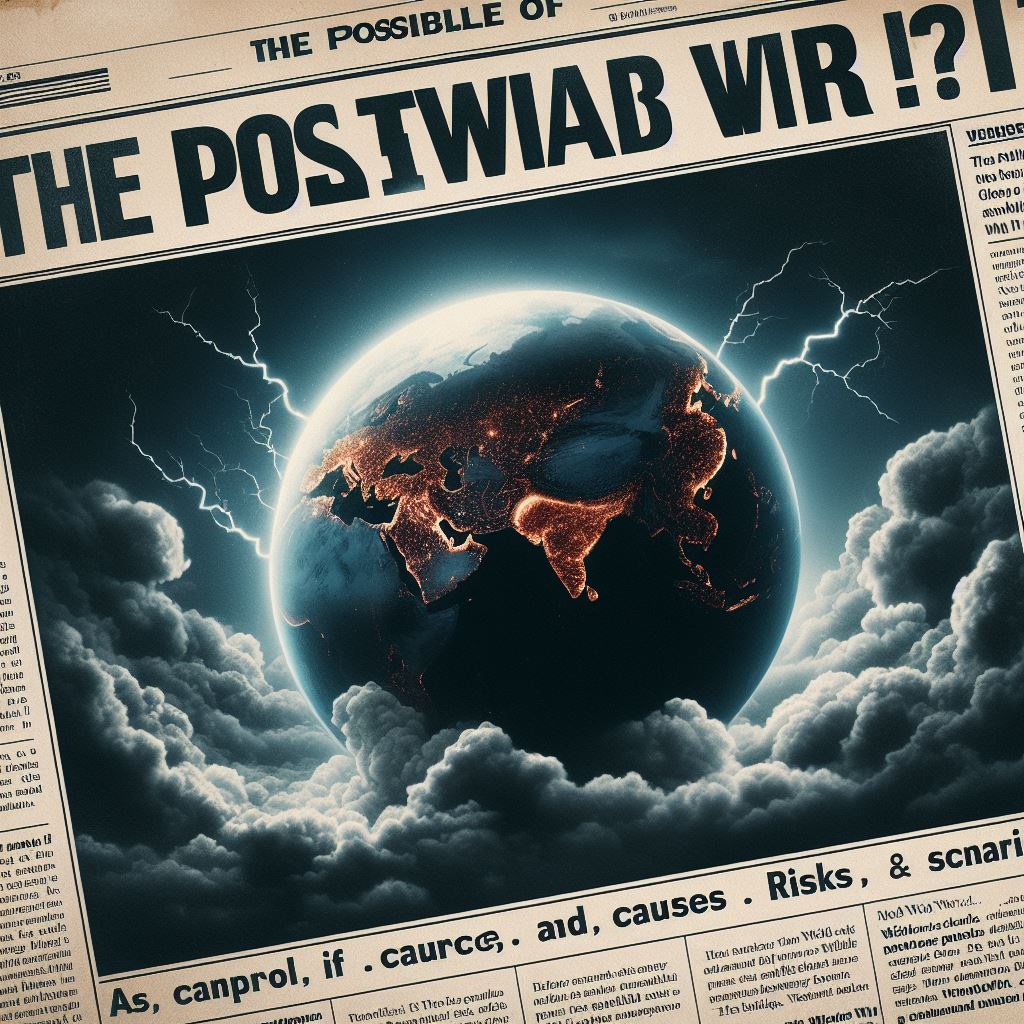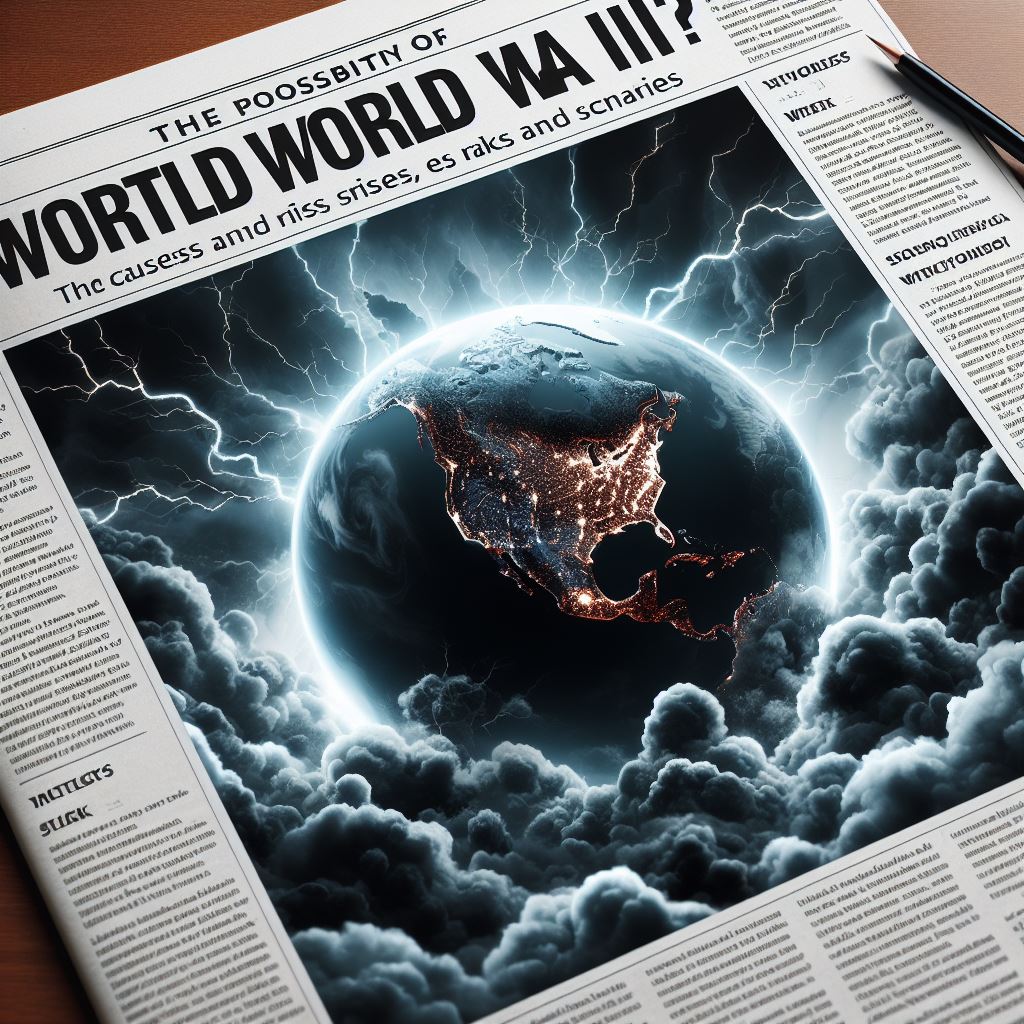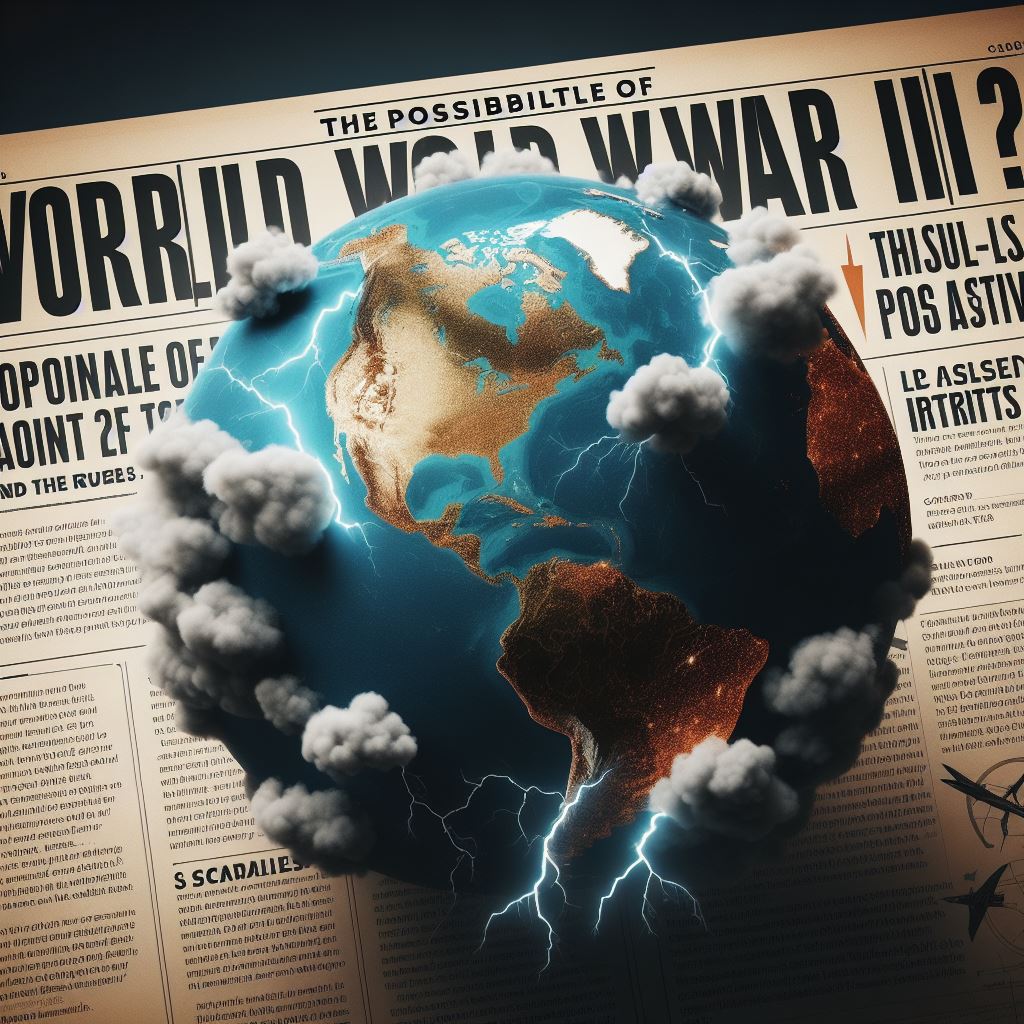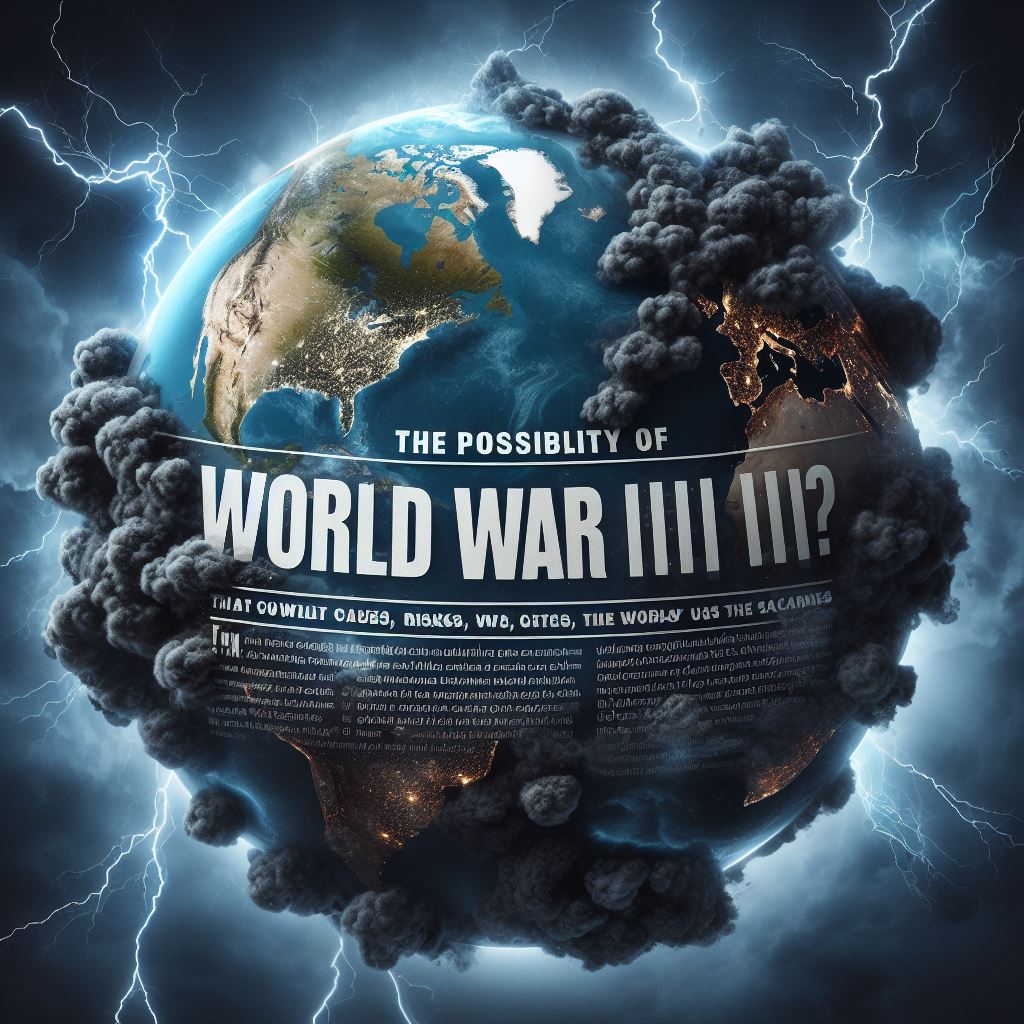Are we facing the potential of World War 3? How close are we to the brink of a worldwide conflict?
Possibility of World War 3 in Near Future: Are we heading for World War Three? Is there a real possibility of World War? How Close Are We to World War 3?




Is there a real possibility of World War III in the near future? Historically, tensions between nations, conflicts over resources, ideological differences, and power struggles have all contributed to the outbreak of wars. Today’s world is not exempt from such tensions, with geopolitical rivalries, nuclear proliferation, regional conflicts, and cyber warfare posing potential flashpoints. However, the likelihood of a world war depends on numerous complex factors and decisions made by political leaders and governments.
Some of these potential flashpoints include:
- Geopolitical rivalries: Tensions between major powers like the United States, China, and Russia over territorial disputes, trade, and military presence could escalate if not managed carefully.
- Nuclear proliferation: The spread of nuclear weapons to additional countries increases the risk of catastrophic conflict due to the devastating consequences of their use.
- Regional conflicts: Ongoing disputes in the Middle East, South Asia, and Eastern Europe could draw in major powers and escalate into larger conflicts if not resolved diplomatically.
- Cyber warfare: The interconnectedness of global systems raises the risk of conflicts in cyberspace, which could spill over into conventional warfare.
Despite these risks, diplomatic efforts, international organizations, and mechanisms aimed at preventing conflicts exist. The global community has learned from past conflicts and generally seeks to avoid the devastation of another world war. While the possibility of World War III cannot be entirely ruled out, it’s not necessarily imminent or inevitable. Continued diplomatic efforts, conflict resolution, and international cooperation are essential in mitigating the risk of large-scale conflicts.
The concern over World War III is prevalent, but there’s no easy answer to how close we are to such an event. Heightened tensions in regions like Ukraine, the Taiwan Strait, and the Korean Peninsula contribute to a sense of unease. The existence of nuclear weapons escalates the stakes significantly, but it also serves as a deterrent for some experts who believe a full-scale war between major powers is unlikely.
While it’s crucial to stay informed about current events, it’s also important to be wary of sensationalized reporting. Diplomacy and international cooperation play vital roles in defusing tensions and preventing war. Numerous organizations, including the United Nations, work towards promoting peace globally.
Examining specific regions, such as Europe, the Middle East, and Asia, reveals potential flashpoints for conflict. However, reasons for cautious optimism exist, including the deterrent effect of nuclear weapons and ongoing diplomatic efforts to de-escalate tensions. It’s challenging to predict the outbreak of a world war definitively, but continued efforts to promote peace, stability, and cooperation are crucial in mitigating the risk of large-scale conflicts.
Historically, tensions between nations, conflicts over resources, ideological differences, and power struggles have all contributed to the outbreak of wars. In today’s world, there are certainly geopolitical tensions and conflicts that could escalate into a global conflict, but it’s important to note that the likelihood of a world war depends on a multitude of complex factors and decisions made by various political leaders and governments.
Some potential flashpoints for conflict include:
- Geopolitical rivalries: Tensions between major powers such as the United States, China, and Russia over issues like territorial disputes, trade, and military presence in various regions could escalate into larger conflicts if not managed carefully.
- Nuclear proliferation: The proliferation of nuclear weapons to additional countries increases the risk of a catastrophic conflict, as the use of nuclear weapons could have devastating consequences for the entire planet.
- Regional conflicts: Ongoing conflicts in regions such as the Middle East, South Asia, and Eastern Europe have the potential to draw in major powers and escalate into larger conflicts if not resolved through diplomacy.
- Cyber warfare: The increasing reliance on technology and interconnectedness of global systems also raises the risk of conflicts in cyberspace, which could potentially spill over into conventional warfare.
However, it’s important to remember that while these risks exist, there are also numerous diplomatic efforts, international organizations, and mechanisms in place aimed at preventing conflicts and promoting peace. Additionally, the global community has learned from past conflicts and generally seeks to avoid the devastation of another world war.
Overall, while the possibility of a World War III cannot be entirely ruled out, it’s not necessarily imminent or inevitable. Continued diplomatic efforts, conflict resolution, and international cooperation remain essential in mitigating the risk of large-scale conflicts.
The possibility of World War 3 is a major concern for many people around the world, and there’s no easy answer. Here’s a breakdown of the current situation:
- Heightened tensions: The ongoing war in Ukraine, rising tensions between China and Taiwan, and North Korea’s nuclear program are all contributing to a sense of unease.
- Risk of escalation: These conflicts have the potential to escalate, especially if there’s a misunderstanding or miscalculation by any of the parties involved.
- Nuclear weapons: The existence of nuclear weapons raises the stakes immensely, as any large-scale war between major powers could potentially turn nuclear.
- Deterrence: However, the destructive power of nuclear weapons is also a reason why some experts believe a full-scale war between major powers is unlikely.
Here are some resources for further reading:
- A recent poll suggests many Britons believe a world war is likely in the next decade: World War 3 likely in next 5-10 years.
It’s important to stay informed about current events, but also to be aware that media can sometimes sensationalize the risk of war. There are many reasons to be hopeful. Diplomacy and international cooperation can help to defuse tensions and prevent war. Here are some organizations working to promote peace:
- The United Nations (https://www.un.org/en/) United Nations | Peace, dignity and equality on a healthy planet
By staying informed and engaged, we can all play a role in promoting peace.
There are several areas of tension around the world that raise concerns about a wider conflict. Let’s break it down region-by-region:
Europe:
- The war in Ukraine is a major concern. Escalation or a direct attack on a NATO member by Russia could trigger a wider war.
Middle East:
- The ongoing conflict between Israel and Palestine, and the presence of groups like Hamas and Hezbollah, create a volatile situation.
Asia:
- Tensions between China and Taiwan, and North Korea’s nuclear program, are potential flashpoints.
Overall Concerns:
- The involvement of major powers like the US, China, and European nations in these regional conflicts raises the stakes of any escalation.
- Miscalculation or misunderstanding by any party could lead to a wider war.
However, there are reasons to be cautious about overly pessimistic predictions:
- Nuclear Deterrence: The destructive power of nuclear weapons makes a full-scale war between major powers less likely, as everyone loses.
- Diplomacy: International efforts to de-escalate tensions and find peaceful solutions are ongoing.
Staying Informed:
- It’s important to follow reliable news sources for updates, but be aware of sensationalized reporting.
By staying informed and engaged, we can all play a role in promoting peace. There’s no definitive answer on how close we are to World War 3, but understanding the areas of tension and the efforts to prevent war can help us navigate this complex situation.
Regarding the possibility of World War III, it’s essential to recognize that tensions exist between various countries and regions, as you mentioned. However, predicting the outbreak of a world war is highly complex and uncertain. While there are potential flashpoints for conflict, including those involving Ukraine, Russia, Hamas, Israel, China, North Korea, the USA, and others, the likelihood of a full-scale global conflict depends on numerous factors, including diplomatic efforts, international relations, and the decisions of political leaders.
It’s crucial for countries to prioritize diplomacy, conflict resolution, and international cooperation to mitigate the risk of large-scale conflicts. While tensions may rise in certain regions, it’s not necessarily indicative of an imminent world war. Continued efforts to promote peace and resolve conflicts through diplomatic means are essential in preventing the escalation of tensions into a global conflict.
Focusing on India specifically, here’s a breakdown of how the situations you mentioned might influence the possibility of World War 3:
India’s role:
- India isn’t directly involved in most of the conflicts as mentioned (Ukraine, Israel-Palestine, etc.). However, a wider war could still impact India through:
- Disruption of global trade and supply chains
- Rising energy prices
- Increased international instability
India’s Border Tensions:
- India’s main areas of concern are its borders with China and Pakistan. These tensions could escalate into a larger conflict, but both countries are nuclear powers, raising the stakes for any full-scale war.
Overall:
- While India is situated near some tense regions, it’s not a central player in the conflicts with the highest risk of escalating into World War 3.
Hopeful aspects:
- India is a strong advocate for diplomacy and peaceful resolutions to international conflicts.
The inclusion of India in the discussion of potential conflict zones adds another layer of complexity to the analysis. India, as a major regional power with a significant population, economy, and military capability, plays a crucial role in international relations. While India has historically pursued a policy of non-alignment and prioritized diplomacy, it faces various challenges and potential sources of conflict.
Tensions between India and Pakistan over the disputed region of Kashmir, as well as ongoing border disputes with China, highlight potential flashpoints for regional conflict. Additionally, India’s strategic interests in the Indian Ocean region and its relationships with other major powers could also impact global geopolitics.
However, the possibility of a world war involving India depends on a multitude of factors, including diplomatic efforts, conflict resolution mechanisms, and the decisions of political leaders. While tensions exist and regional conflicts persist, it’s important for countries to prioritize dialogue, negotiation, and peaceful resolution of disputes to prevent the escalation of conflicts into a larger-scale war.
As with any discussion of world war, the situation is highly complex and uncertain, and predicting the future with certainty is challenging. Continued efforts to promote peace, stability, and cooperation in the region and globally are essential in mitigating the risk of large-scale conflicts.
There is a lot of concern about the possibility of World War 3 these days. Here’s a breakdown of the current situation:
- Increased Tensions: Geopolitical tensions between major powers like the US, China, and Russia are high. Recent events like the ongoing war in Ukraine and rising competition in the South China Sea contribute to these anxieties.
- Nuclear Weapons: The presence of nuclear weapons adds another layer of danger, as a single escalation could have devastating consequences.
- Expert Opinions: Some experts believe the risk of war is significant, while others see it as less likely. Public opinion polls also reflect growing worries about a potential global conflict.
- Importance of Diplomacy: Efforts at diplomacy and de-escalation are crucial in preventing war. Open communication and finding common ground are essential.
Is World War 3 looming on the horizon? Are we edging closer to the brink of global conflict?
Could World War Three be a reality in the near future? Is the specter of a global war looming?
Are we inching towards World War 3? What are the chances of a global conflict erupting?
Is World War Three imminent? How close are we to the possibility of a global military confrontation?
Are we on the verge of World War 3? Is there a genuine risk of global warfare?
Is the world teetering on the edge of World War 3? How close are we to the brink of a global conflict?
Are we heading towards World War Three? What is the likelihood of a global war breaking out?
Could World War 3 be on the horizon? How imminent is the threat of global conflict?
Is the world on the path to World War 3? How real is the possibility of a global military conflict?
Are we facing the potential of World War 3? How close are we to the brink of a worldwide conflict?
